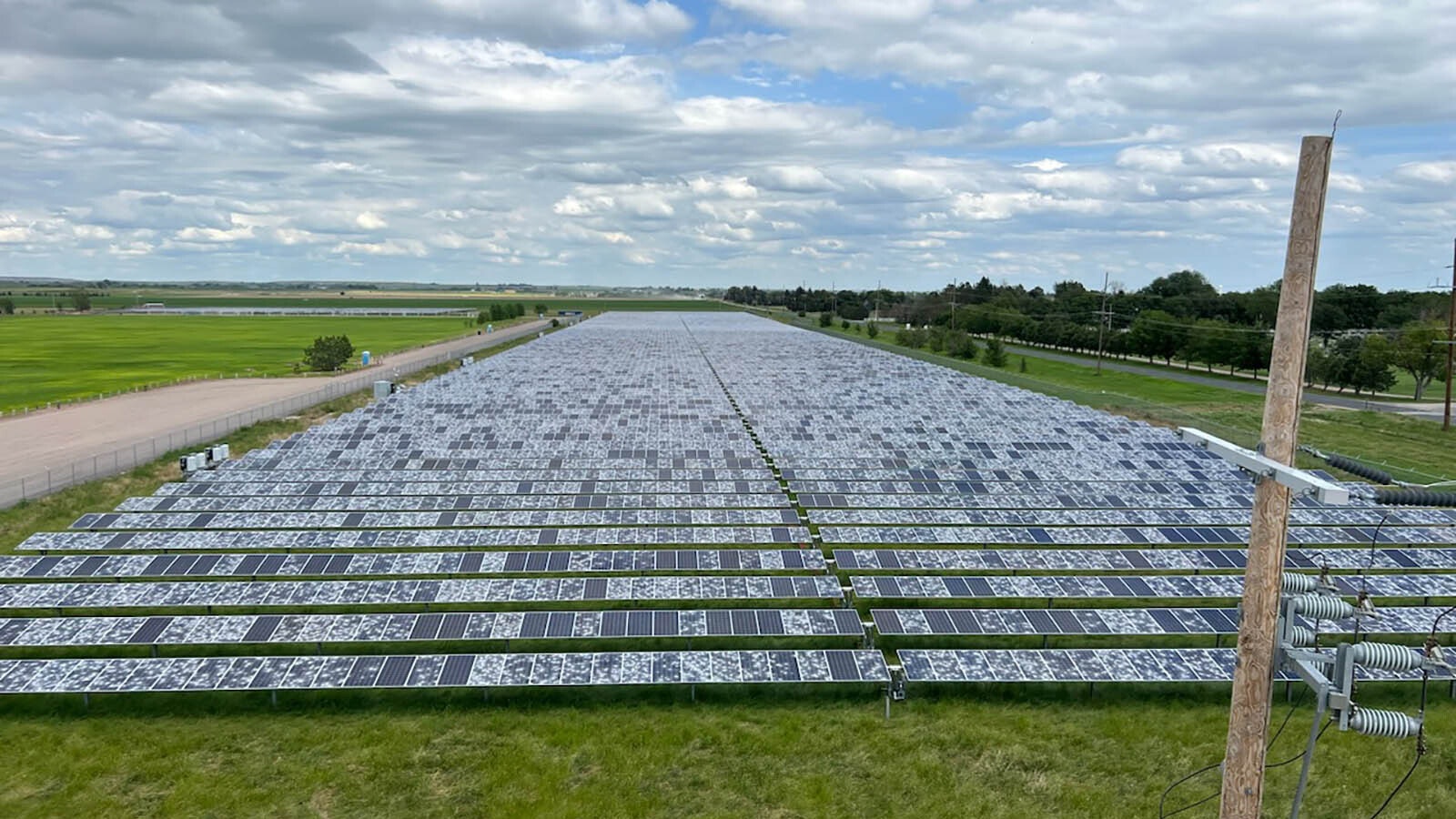Another solar farm is coming to Wyoming. If completed, it will be the third commercial-scale solar farm in the state.
The proposed Goshen Solar Project is a 163-megawatt solar farm located on 1,227 acres of private land about 10 miles southwest of Yoder, 70 miles northeast of Cheyenne.
“I think it’s a useless effort,” Yoder Mayor Norman Feagler told Cowboy State Daily.
Feagler said he’s not against alternative sources of electricity, but he’s concerned with the amount of land wind and solar farms take up.
“Solar panels — you can’t build enough of them,” he said. “If we covered all the farm ground in the United States to have enough electricity, you wouldn’t have anything to eat.”
Then there’s the fact that the development will be in the famous “Hail Alley” region of southeastern Wyoming, Nebraska and Colorado that’s notorious for its powerful hailstorms.
Industrial Siting
The project developers, Greenvote Power and Cowboy Energy, submitted an industrial siting application this week with the Wyoming Department of Environmental Quality.
Commercial solar facilities that exceed 30 megawatts or result in a surface disturbance greater than 100 acres are required to get permission from the Industrial Siting Council. The purpose is to ensure that impacted communities and counties have the capacity to provide increased service demands — housing, water, emergency services, medical services and traffic — that the project would cause.
Project construction, according to the developers’ application, would take 16 months and begin in January. Commercial operation is expected by April 2025.
According to the application, the construction will have a peak of 382 temporary jobs, and the operation will have 10 full-time staff.
The estimated ad valorem taxes are about $1.9 million per year, with a total $25.8 million paid by 2054. Estimated sales taxes will total $8.1 million during the construction period, with $1.6 million going to Goshen County and $4.3 million to the state. Impacted communities will share in $2.1 million, of which $40,607 will be distributed to Yoder.
Boondoggles And Blight
Feagler isn’t the only one with concerns about the project.
Sen. Cheri Steinmetz, R-Lingle, told Cowboy State Daily she is concerned about how solar projects might spread across Wyoming, as wind farms have, gobbling up valuable land.
“Hanging in the balance of the Biden solar slush fund is the actual long-term cost of taking large swaths of agricultural land out of production in pursuit of unreliable, unaffordable, government subsidized energy boondoggles. Clearly, solar is expensive, unnecessary and a blight on our beautiful Wyoming landscape,” Steinmetz said.
She said that solar masquerades as green energy, but the panels are mostly manufactured in China, with toxic components that are harmful to humans during the mining of the raw materials and manufacturing process.
With the frequency of hailstorms in the area, Steinmetz said, the panels may get destroyed before the end of the project lifetime. If that happens, they’ll likely end up in a landfill.
Cool And Scary
Meteorologist Chris Martz told Cowboy State Daily the hail risk in Wyoming, especially in the southeast corner, is quite high.
“Hail is pretty common, especially really large hail,” Martz said. “And that’s not going to be a great environment for solar development.”
This may explain why Wyoming, despite its abundance of sunshine, currently has only one commercial-scale solar farm in operation.
Martz said that in rain clouds, water can remain a liquid state at temperatures as low as minus 40 degrees Fahrenheit. Inside storm clouds, updrafts carry this cold water up, where it can form ice crystals. These pieces of hail get tossed into these updrafts and continue to grow.
“Until it’s too heavy, and then it falls,” Martz said.
When it falls over Wyoming terrain, it doesn’t have far before it hits the ground. It doesn’t spend much time in warmer air where it would melt. So, in these higher elevations with the right storm systems, Wyoming gets a lot more hail.
“It’s pretty cool. It’s pretty scary, too,” Martz said. “But pretty cool if you’re into severe weather stuff.”
Prepared For Hail
The solar developers are prepared to deal with the Wyoming hail.
Paul Shroud, director of Cowboy Energy, told Cowboy State Daily that the solar panels will be mounted on a system that allows the panels, in the event of a hailstorm, to be turned toward the ground.
“The panels will also be treated and hardened to handle most hailstones,” Shroud said.
Shroud said that the full-time operational staff could be as much as 10 employees, but could be as few as one.
“The monitoring system will require around two people minimum and additional staff for maintenance and problem shooting,” he said.
Shroud said that the tax revenues and employment opportunities will bring great benefits to Goshen County.
Eminent Domain
Steinmetz said that landowners across the state are growing concerned about renewable energy projects spreading across the state.
One concern, she said, is the use of eminent domain to build transmission lines in support of independently owned wind and solar farms.
“With the amount of federal dollars being doled out from the Biden administration for these green Ponzi schemes, the Joint Ag Committee is working on legislation to prohibit private for-profit companies from executing a ‘taking’ of private property in order to line their own pockets,” Steinmetz said.
The Goshen Solar project, according to the Industrial Siting Application, will connect to a transmission line already located on private land within the project area. There will be no need for additional transmission towers.





